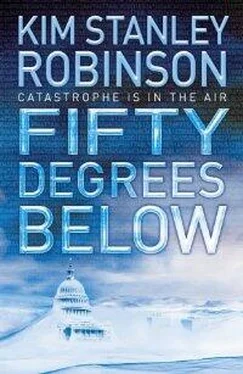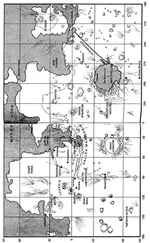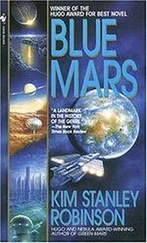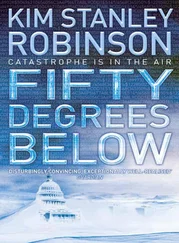“Would they be more dangerous? I bet you could make them so big and solid they wouldn’t be any more dangerous than these.”
“These were reckoned pretty dangerous.”
“I don’t hear of many accidents, given that there are thousands of them out all the time.”
They moved from one set of big windows to the next, taking in the views.
“It’s like the San Joaquin Valley,” Frank said. “There are these huge irrigation rigs that roll around spraying stuff.”
Diane nodded. “I wonder if this will work.”
“Me too. If it doesn’t…”
“I know. It would be hard to talk people into trying anything else.”
“True.”
Around and around the bridge they walked. Everyone else was doing the same, in a circulation like that at any other party. Blue sky, blue sea, the horizon ticked by tiny wavelets, as in a pattern on wallpaper; and then the fleet, each ship haloed by a wind-tossed cloud of white mist. Frank and Diane caught each other by the shoulder to point things out, just as they would have in Optimodal. A bird; a fin in the distance.
Then another group arrived in the room, and soon they were escorted to Diane: the Secretary-General of the UN, Germany’s environmental minister, who was the head of their Green Party and a friend of Diane’s from earlier times; lastly the prime minister of Great Britain, who had done a kind of Winston Churchill during their hard winter, and who now shook Diane’s hand and said, “So this is the face that launched a thousand ships,” looking very pleased with himself. Frank couldn’t be sure Diane caught the reference; she was already smiling, and distracted by the introduction of others in the new group. They all chatted as they circled the room, and after a while Diane and Frank stood in a big circle listening to the others, their upper arms just barely touching as they stood side by side.
Alter another hour of this, during which nothing varied outside except a shift west in the angle of the sun, it was declared time to go; one didn’t want the helicopters to get too far from Reykjavik, and there were other visitors waiting in Iceland for their turns to visit; and the truth was, they had seen what there was to see. The ship’s crew therefore halted the Hugo Chavez’s prodigious launching of salt, and they braved the chilly blast downstairs and got back in their helo. Up it soared, higher and higher. Again the astonishing sight of a thousand tankers on the huge burnished plate spreading below them, an astonishing sight, instantly grasped as unprecedented: the first major act of planetary engineering ever attempted, and by God it looked like it.
But then the helo pilot ascended higher and higher, higher and higher, until they could see a much bigger stretch of ocean, water extending as far as the eye could see, for hundreds of miles in all directions—and all of it blank, except for their now tiny column of ships, looking like a line of toys. And then ants. In a world so vast, could anything humans do make a difference?
Diane thought so. “We should celebrate,” she said, smiling her little smile. “Do you want to go out to dinner when we get back?”
“Sure. That would be great.”
* * *
Election day saw winter return to Washington in force. It was icy everywhere, in places black ice, so that even though everything seemed to have congealed to a state of slow motion, cars still suddenly took to flight like hockey pucks, gliding majestically over the roads and looking stately until they hit something. Sirens dopplered hither and yon, defining the space of the city that was otherwise invisible in its trees. Again there were scheduled brownouts, and the wood smoke of a million fireplace fires rose with the diesel smoke of a million generators, their gray and brown strands weaving in the northwest wind.
The polls were open, however, and the voters lined up all bundled in their winter best—a best that was much better than it had been the year before. The story of the day became the story of the impact of the cold on the vote, and which party’s faithful would brave it most successfully, and which would benefit most from this clear harbinger of another long winter. The first exit polls showed a tight race, and as no one believed in exit polls anymore anyway, anything was possible. It felt like Christmas.
And in fact it was the Buddhist holiday celebrating Dorje Totrengtsel, as it turned out. To celebrate it, and perform a dedication ceremony for their new home in the country, the Khembalis had scheduled a big party for that very day.
Possibly some of those they invited did not make it, because of the meteorological or political complications; but a couple hundred of them did. They gathered in a big crowd under a large unwalled pavilion tent, set up next to the old farmhouse, still empty and in need of renovation.
It took well over an hour for the Quiblers to drive out to the farm, Charlie at the wheel of their Volvo station wagon inching along, Anna in the back with the boys. Joe declaimed a long monologue remarking on the snowy view, and his displeasure that they were not stopping to investigate it: “Look! Stop! Look! Stop the car!”
When they got to the farm they found Frank was just arriving himself. They parked next to his van and walked around the farmhouse.
Drepung and Rudra were out back on the snowy lawn, steam pouring from their mouths and noses. They were kicking patterns of frosty green out of the thick flock of new snow on the grass. At the center of this improvised mandala stood a blocky shapeless snowman with a demon mask hung on its head, grinning maniacally into the wind. Before it lay a lower block of snow, like the altar stone at Stonehenge. On the flattish top of this mass some of Joe’s building blocks were stacked, in two little towers. Two red then green, two red then yellow.
The two men waved cheerily when they saw the Quiblers. They pointed at their handiwork, and watched with pleasure as Joe in his thick snowsuit and boots trundled over ahead of the rest to investigate. They lifted him between them the better to see the two towers his blocks now made. He kicked reflexively at the stacks, and Rudra and Drepung laughed and swung him back and forth, each holding with both hands one of the toddler’s mittened fists. When he kicked over one of them, they put him down with many congratulations. “Ooooh! Karmapa!”
Frank went inside to check on lunch, and came back out carrying two paper cups of a hot mulled cider that he reported had no yak butter in it. He gave one to Anna, who wrapped her hands around it gratefully. Charlie sniffed the steam pouring off it and went in to get one of his own. He spent a while in there talking to Sridar, his old lobbying partner, who had taken on the Khembalis as a client the year before, and was now representing them to Congress and other powers in the capital, with some success and a great deal of amusement. They exchanged the usual sentiments on the election taking place, shaking their heads in the attempt to pretend they did not hope very much.
When Charlie went back outside, he felt again how frigid the day was. Anna huddled against him, nearly shivering despite her bulky coat. The Khembalis and Joe did not seem to mind. Now they were walking around the snow figure in a little march, chanting nonsense together, a string of syllables followed by a big “HA,” repeated again and again. Joe stomped into the snow as deeply as Drepung, his eyes ablaze under his hood, his cheeks bright red.
“He’s getting too hot in his suit,” Charlie said.
“Well, he can’t take it off.”
“I guess not.”
“They’re having fun,” Frank observed.
“Yes.”
“Joe must be heavy the way he sinks into that snow.”
Читать дальше
Конец ознакомительного отрывка
Купить книгу












